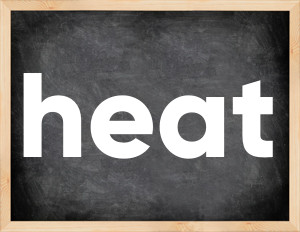 The English verb 'heat' is pronounced as [hiːt].
The English verb 'heat' is pronounced as [hiːt].
Related to:
regular verbs.
3 forms of verb heat: Infinitive (heat), Past Simple - (heated), Past Participle - (heated).
Here are the past tense forms of the verb heat
👉 Forms of verb heat in future and past simple and past participle.
❓ What is the past tense of heat.
Heat: Past, Present, and Participle Forms
| Base Form | Past Simple | Past Participle |
|---|---|---|
| heat [hiːt] |
heated [ˈhiːtɪd] |
heated [ˈhiːtɪd] |
What are the 2nd and 3rd forms of the verb heat?
🎓 What are the past simple, future simple, present perfect, past perfect, and future perfect forms of the base form (infinitive) 'heat'?
Learn the three forms of the English verb 'heat'
- the first form (V1) is 'heat' used in present simple and future simple tenses.
- the second form (V2) is 'heated' used in past simple tense.
- the third form (V3) is 'heated' used in present perfect and past perfect tenses.
What are the past tense and past participle of heat?
The past tense and past participle of heat are: heat in past simple is heated, and past participle is heated.
What is the past tense of heat?
The past tense of the verb "heat" is "heated", and the past participle is "heated".
Verb Tenses
Past simple — heat in past simple heated
(V2).
Future simple — heat in future simple is heat (will + V1).
Present Perfect — heat in present perfect tense is
heated
(have/has + V3).
Past Perfect — heat in past perfect tense is
heated
(had + V3).
heat regular or irregular verb?
👉 Is 'heat' a regular or irregular verb? The verb 'heat' is regular verb.
Examples of Verb heat in Sentences
- Pool heated in january (Past Simple)
- Our rooms heated up quickly (Past Simple)
- It will actually heat the water layer around my body. (Future Simple)
- The scientist has discovered a new way to heat steel. (Present Perfect)
- We weren't the first to optimize packing space or waterproof items or heat and cool structures. (Present Simple)
- People have abilities, unusual ones, and we believe that you can heat objects, set them on fire. (Present Simple)
- Why is it advisable to heat some foods? (Present Simple)
- It can be chilly at night, so I heated your blanket. (Past Simple)
- A sufficiently powerful series of shock waves can squeeze and heat the fuel in the center so that a thermonuclear reaction begins. (Present Simple)
- She managed to heat the milk to put in her gin, though. (Past Simple)